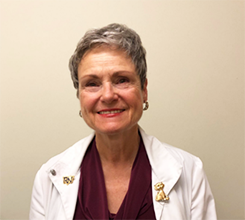Read about day four events and register.
-
9:00 a.m. | Senior’s health | The Neil and Susan Manning Cognitive Health Initiative at five years
The Neil and Susan Cognitive Health Initiative is a donor-initiated collaboration between Island Health, UVic, and UBC, to improve diagnostic and treatment opportunities for patients with dementia and related disorders. As part of the initiative, a Specialist Memory Clinic has been created at Island Health. This clinic has been created with purpose, to encompass the elements that constitute a Learning Health System (LHS). We will review these elements and describe how activities within our Initiative and Clinic embody the creation of a LHS for dementia care. In doing so we will highlight how there are currently few models describing how to apply the theory of a LHS into practice, and how our experience can inform the creation of such models.
Learning objectives:
- Describe the basic infrastructure required for donor-funded initiatives to successfully engage health authority and academic partners.
- Apply the theoretical principles of a LHS into practice for cognitive disorders.
- Describe the challenges and opportunities with creating a LHS for cognitive disorders in a regional health authority.
Speakers:
- Alexandre Henri-Bhargava, MDCM, MScCH, FRCPC, medical director, Neil and Susan Manning Cognitive Health Initiative; clinical associate professor of medicine, UBC; affiliate associate professor, Division of Medical Sciences, University of Victoria

- Tracey Thompson-Franson OT, BSc(OT), MRSc, manager, Quality, Accreditation and Process Improvement, Island Health; project manager, Cognitive Health Initiative

- Kristine Votova, director, Medical and Academic Affair, Island Health; adjunct professor, Division of Medical Sciences, University of Victoria

-
10:00 a.m. | COVID-19 | Research innovations shaping our response to COVID-19
Join us to hear from four different researchers and how their discoveries have helped shape our response to COVID-19.
Speakers:
- David Granville, PhD (moderator), executive director, Vancouver Coastal Health Research Institute, and associate dean, Research (VCHRI), Faculty of Medicine, University of British Columbia

- Mypinder Sekhon, MD, PhD, intensivist and clinician scientist, Vancouver General Hospital and UBC

- Savvas Nicolaou, MD, FRCPC, PhD, professor of radiology, UBC; department head, Radiology, Vancouver Coastal Health

- Renelle Myers, MD, FRCPC, respirologist; clinical associate professor, Medicine, UBC; medical director, Bronchoscopy and Interventional Pulmonary, Vancouver General Hospital

- Horacio Bach, PhD, researcher, Immunity and Infection Research Centre; clinical assistant professor, Faculty of Medicine, Division of Infectious Diseases, UBC

View the session recording.
- David Granville, PhD (moderator), executive director, Vancouver Coastal Health Research Institute, and associate dean, Research (VCHRI), Faculty of Medicine, University of British Columbia
-
11:00 a.m. | COVID-19 | B.C.'s research response to the COVID-19 pandemic: the good, the bad and the future
During the COVID-19 pandemic, health research findings saved lives and eased the suffering of millions across the globe. But there is no question that the unprecedented mobilization of research could have been more effective. As we come out of the pandemic, what are the lessons learned about the role of research in a global pandemic? In particular, how did B.C. fare in comparison to other jurisdictions, and where might we play to our strengths and address our weaknesses? Join B.C. Strategic Research Advisory Committee Co-Chairs David Patrick and Bev Holmes for a conversation about what went well, what did not go well and where we go from here as our provincial research system builds back better after COVID-19.
Learning objectives:
- To explore learnings of the mobilization research during the COVID-19 pandemic
- To understand opportunities and challenges for our provincial research system after COVID-19
Speakers:
- Bev Holmes, PhD, C. Dir, MA, CEO, Michael Smith Health Research BC

- David Patrick, MD, director of research, BC Centre for Disease Control

-
12:00 p.m. | Community health | Research on early years and childhood
Supporting children and families requires collective efforts across sectors to positively influence childhood outcomes. This presentation will provide an overview on population level measures of childhood health and wellbeing in northern B.C. and highlight current research and partnerships across the north. We will discuss how relational ways of being, listening and learning from families and providers has led to co-creation of short-to-longer term research priorities and activities and enhanced partnerships for childhood health initiatives in the north.
Speakers:
- Dr. Caroline Sanders, MBE, associate professor and registered nurse, School of Nursing, UNBC

- Erica Koopmans, PhD student, Child Health BC regional coordinator, Northern Health

- Tess Amyot, B. Sc., research assistant, UNBC

- Dr. Caroline Sanders, MBE, associate professor and registered nurse, School of Nursing, UNBC
-
1:00 p.m. | Mental Health and Substance Use | Mental Health and Substance Use research at Fraser Health
From research dynamics to dynamical research: conducting patient-oriented research during the overdose crisis, the COVID-19 Pandemic, fires, floods and a heat dome
This is a patient oriented research practice story that began during the height of the dual health crisis in December 2020 that focused on the experiences of people accessing virtual opioid agonist treatment during COVID-19. Within months, what was considered a dynamic research endeavor soon turn into an adventure with more twists and turns than imagined. Fires, floods and a heat dome emerged which created dynamical forces, affecting participant recruitment and data collection. More so, the virtual OAT treatment model studied, changed and adapted to client needs. Most importantly, the patient partners' first time experience with research revealed needed changes to how we work with people with living experience using an equity and trauma informed lens. This talk will share highlights, learnings and unanswered questions that can inform future projects in dynamical research settings requiring equity-led processes.
Speakers:
- Nitasha Puri, MD

- Marika Sandrelli, BSW, MEd, knowledge exchange leader, Mental Health and Substance Use (MHSU) Services, Fraser Health
- Brady P., patient partner, Peer Researcher, MHSU Services, Fraser Health

- Randee M., patient partner, Peer Researcher, MHSU Services, Fraser Health
Pulling delirium care into the 20th century - a digital interventional to de-escalate agitated delirious patients
Agitated delirious patients are tough to manage and, sadly, often hospital staff resort to the use of anti-psychotic medications and restraints. Our group studied a screen-based distraction device to de-escalate agitated patients with an aim to reduce the need for potentially harmful medications. In a sample size of 70 patients, we observed a significant drop in standardized agitation and a reduction in medication use of over 25%.
Speaker:
- Steve Reynolds, MD, Intensive study, Royal Columbian Hospital; executive lead, Royal Columbian Hospital Innovation Institute; associate professor, SFU; clinical associate professor, UBC; TB Vets Chair in Critical Care Research
Nursing care and the impact on delirium
This presentation will provide on overview of study in progress that is examining how critical care nurses prioritize patient care and the potential impact on delirium management. The presentation will describe the importance of the delirium prevention and management within the critical care context, as well as describe the study aimed at understanding the interplay between care and delirium. The study is funded by the Michael Smith Foundation for Health Research.
Speaker:
- Sarah Crowe, MN, PMD-NP(F), NP, CNCC(C), nurse practitioner, Critical Care, Fraser Health
Implementing dialectical behavior therapy in Fraser Health: shaping the system
Fraser Health has been gradually implementing Dialectical Behavior Therapy (DBT) since 2018. Standard DBT helps complex highly suicidal clients with emotional and/or behavior dysregulation, but has multiple components, is resource-intensive and, therefore, difficult to implement fully. It is usually most challenging to implement a 24/7 phone coaching component, including in Fraser Health. To see how to best adapt DBT to our setting, we interviewed some of our DBT clinicians about barriers and alternatives to the 24/7 phone coaching aspect of DBT. We used the results, along with Fraser Health’s adapted DBT program evaluation, to propose further DBT training and program development – now underway.
Speaker:
- Martina Smit, MD, psychiatrist, Surrey Mental Health and Substance Use Services and Surrey Urgent Care Response Centre for Mental Health
View the session recording.
- Nitasha Puri, MD
-
2:00 p.m. | Rural health | Improving acute stroke care: a review of two innovative Canadian studies
The AcT study completed enrollment on January 26, enrolling 1,600 patients at 24 hospitals across Canada. This study compared two clot-dissolving drugs, alteplase and tenecteplase, in treatment of acute ischemic stroke. The FRONTIER study is currently still enrolling patients at three stroke centres in B.C.: Vancouver General, Royal Columbian and Kelowna General Hospitals. It is comparing a novel neuro-protective agent, Nerenitide, to placebo (normal saline) to patients with acute stroke symptoms, administered by paramedics prior to the patient’s arrival in the emergency department. The presentation will give a brief overview of ischemic stroke, outline both studies and discuss the positive implications of each on managing acute stroke.
Speaker:
- Marie McClelland, RN, clinical research coordinator, stroke nurse

- Marie McClelland, RN, clinical research coordinator, stroke nurse
-
2:00 p.m. | Community health | Developing a partnership plan for patient-oriented research studies
What does it take to develop, plan and sustain meaningful partnerships in patient-oriented research?
This presentation will reflect upon our experiences of a patient-driven research partnership exploring pressure injury risk and management in persons living with spinal cord injury. Through this, we will share our experiences of partnership initiation and planning, highlighting our approach to generating partnership agreements and shared decision-making processes. We will identify key relational practices that promote inclusive and safe research spaces, as underpinned by an integrated knowledge translation approach, and will explore strategies that can help sustain and expand partnerships in a meaningful and respectful way.
Speakers:
- Dr. Davina Banner-Lukaris, associate professor of Nursing, UNBC

- John Chernesky, consumer engagement lead, Praxis Spinal Cord Institute

- Spring Hawes, disability consultant and small business owner

- Dr. Davina Banner-Lukaris, associate professor of Nursing, UNBC
-
3:00 p.m. | Practical skills | How data infrastructure is driving improved quality of care across Island Health
In this presentation, Island Health employees share how their teams use REDCap management to enhance quality of care by improving tracking and reporting of service provision, benchmarking and collaboration with partners.
Speakers:
- Donna McColl, medical office assistant, Diabetes Education Centre, Island Health
- Laura Shaw, quality management coordinator, Cardiac Care, Island Health
- Tyrone Trotter, paramedic supervisor, BC Emergency Health Services
- Stephen Haigh, paramedic practice educator, BC Emergency Health Services
- Victor Espinosa, MSc, statistics and informatics manager, Research, Island Health
View the session recording.


